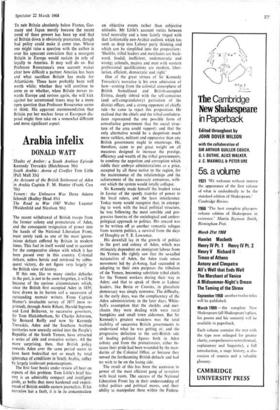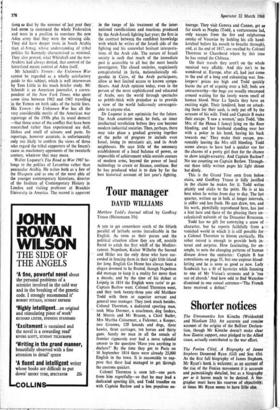Arabia infelix
DONALD WATT
South Arabia: Arena of Conflict Tom Little (Pall Mall 35s) ' An Account of the British Settlement of Aden in Arabia Captain F. M. Hunter (Frank Cass 70s) • Yemen : the Unknown War Dana Adams Schmidt (Bodler Head 45s) The Road to War 1967 Walter Laqueur (Weidenfeld and Nicolson 50s) The recent withdrawal of British troops from the former colony and protectorate of Aden, and the consequent resignation of power into the hands of the National Liberation Front, , . must surely rank as one of the most ignom- inious defeats suffered by Britain in modern times. This fact in itself would tend to account for the comparative silence with which it has been passed over in this country. Colonial defeats, unless heroic and retrieved by sUtrie- quent victory, do not figure very largely in • the British view of history.
If this one, like so many similar debacles in the past, is not to be soon forgotten, it will be because of the curious circumstances which, since the British first occupied Aden in 1839, have drawn to its barren soil a succession of outstanding memoir writers. From Captain Hunter's invaluable survey of 1877 (now re- printed), through Amin Rihani, Harold Ingrarns and Lord Belhaven, to successive governors, Sir Tom Hickinbotham, Sir Charles Johnston, Sir Bernard Reilly and now Sir Kennedy Trevaskis, Aden and the Southern Arabian territories now uneasily united into the People's Republic of the South Yemen, have attracted a series of able and evocative writers. All The more surprising, then, that British policy towards Aden over the same period seems to have been bedevilled not so much by total ignorance of conditions in South Arabia, rather by largely irrelevant preconceptions.
The first four books under review all bear on aspects of this problem. Tom Little's brief his- tory is an admirably compact and intelligent guide, as befits that most hardened and exiSeri- enced of British middle eastern journalists. If his narrative has a fault, it is in its Concentration on objective events rather than subjective attitudes. Mr Little's account varies between total neutrality and a tone faintly tinged with that fashionable neo-Arabist outlook which has sunk so deep into Labour party thinking and which can be simplified into the proposition : 'Sheikhs, tribal leaders and merchants are back- ward, feudal, inefficient, undemocratic and wrong; colonels, majors and men with western professional qualifications are modern, liber- tarian, efficient, democratic and right.'
One of the great virtues of Sir Kennedy Trevaskis's narrative is his own admission of how—coming from the colonial atmosphere of British Somaliland and British-occupied Eritrea, deeply inbred with the self-conscious (and self-congratulatory) patriotism of the district officer, and a strong opponent of chiefly rule—he came to reject this proposition. He realised that the chiefs and the tribal confedera- tions represented the one possible form of consultative government that the social struc- ture of the area could support; and that the only alternative would be a despotism much more ruthless, militant and oppressive than any British government ought to encourage. He, therefore, came to put great weight on all measures designed to increase the prestige, efficiency and wealth of the tribal governments, to condone the nepotism and corruption which riddle their embryo administrations as a price, accepted by all those native to the region, for the maintenance of the relationships and the achievement of the necessary consensus, with- out which the system would totally collapse.
Sir Kennedy made himself the loudest voice in favour of the speedy transfer of power to the local rulers, and the least interference.
Today many would recognise that, in attempt- ing to work with the local political structure, he was following the most -sensible and pro- gressive theories of the sociological and anthro- pological approach to politics. His reward was to be written off as another romantic refugee from western politics, a survival from the days of Doughty or T. E. Lawrence.
His downfall lay in the growth of politics in the port, and colony of Aden, which. was intimately dependent on immigrant labour from the Yemen. He rightly saw that the so-called nationalists of Aden, the Aden trade union movement led by al-Asnag, had succeeded in adapting to their own purposes the tribalism of the Yemen, becoming substitute tribal chiefs for the Yemeni workers during their stay in Aden; and that to speak of them as Labour leaders, like Bevin or Cousins, in pluralistic
democracy was simply nonsense. The difficulty, in the early days, was the complacency of the Aden administration; in the later days, White- hall's assumption that the sheikhs and mer- chants they were dealing with were rural bumpkins and small town aldermen. But Sir Kennedy's greatest weakness was the total inability of successive British governments to understand what he was getting at; and the progressive defection to the anti-British side of leading political figures both in Aden colony and from the protectorates, either be- cause their pride had been wounded by the man- darins of the Colonial Office, or because they sensed the forthcoming British debacle and had
no wish to be on the losing side. .
The result of this has been the accession to power of the most efficient gang of terrorists with local roots. The success of the National Liberation Front lay in their understanding of tribal politics and political mores, and . their ability to manipulate these within the Federa- don; so that by the summer of last year they had COMIC to command the whole Federation and were in a position to convince the new Aden army that they were the winning side. They did have deeper roots in South Arabia than al-Asnag, whose understanding of tribal politics Sir Kennedy characterised as minimal. They also proved, what Whitehall and the neo- Arabists had always denied, that control of the hinterland meant control of Aden itself.
Mr Schmidt's Yemen : the Unknown War cannot be regarded as a wholly satisfactory guide to this subject, which is well interwoven by Tom Little in his much briefer study. Mr Schmidt is an American journalist, a corres- pondent of the New York Times, who spent some time between 1962 and 1965 travelling in the Yemen on both sides of the battle lines. His Yemen : the Unknown War has all the very considerable merits of the American war reportage of the 1930s plus its usual demerit —that those areas of the conflict that have been researched rather than experienced are dull, lifeless and smell of scissors and paste. Its reportage, however accurate, is unfortunately only too likely to confirm the views of those who regard the tribal supporters of the Imam's cause as reactionary opponents of the twentieth century, whatever that may mean.
Walter Laqueur's The Road to War 1967 be- longs to the politics of Levantine rather than peninsular Arabia. He writes both as a Jew of the Diaspora and as one of the most able of the younger contemporary historians, director of the Institute of Contemporary History in London and visiting professor at Brandeis University in America. The second is apparent
in the range of his treatment of the inter- national ramifications and reactions produced by the Arab-Israeli fighting last year; the first in the contrast between the confident knowledge with which he writes of the Israeli side of the fighting and his somewhat hesitant interpreta- tions of the Arab side. The nature of Israeli society is such that much of the immediate past is accessible to all but the most hostile investigator. The closed societies, suspiciously conspiratorial in Syria, nationalistically oli- garchic in Cairo, of the Arab participants, allow at best limited access to known sympa- thisers. And Arab opinion today, even in the person of the most sophisticated and educated of Arabs, sees the world through spectacles so pebble-thick with prejudice as to provide a view of the world ludicrously unrecognis- able to anyone else.
Dr Laqueur is not optimistic for the future. The Arab countries need, he feels, an inner intellectual revolution before they can become modern industrial societies. Then, perhaps, there may take place a gradual growing together of the paths of progress to include even Israel, losing its messianic air, and its Arab neighbours. He says little of the necessary establishment of a local balance of power, so impossible of achievement while outside sources of modern arms, beyond the power of local technology to create or finance, continue. But he has produced what is to date by far the best historical account of last year's fighting.







































 Previous page
Previous page